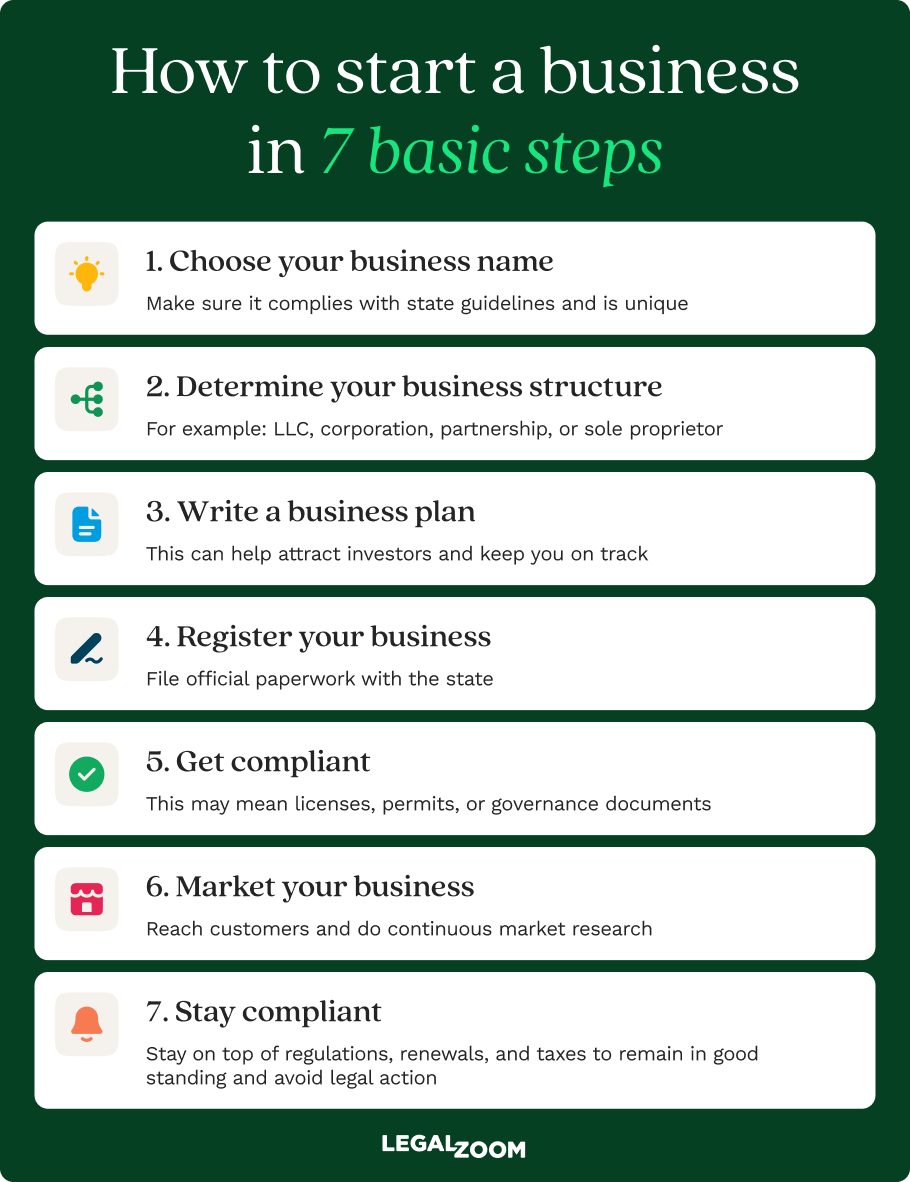If you’re a licensed professional, like a doctor, lawyer, accountant, or therapist, forming your own practice can mark a major milestone in your career. It gives you a chance to run your business on your own terms.
Before you can open your doors, there are ways you can protect your practice and start things off on the right legal footing. One simple way to reduce your liability risk and make your practice look more professional is to open a professional limited liability company (PLLC).
Key points
- PLLCs are not available in every state.
- Professional limited liability companies are exclusively available to licensed professionals in certain fields, such as CPAs, architects, lawyers, or medical services providers like doctors.
- PLLCs protect members’ personal assets from business liability, meaning members’ personal assets can’t typically be used to settle business debts or pay for settlements.
- Forming a PLLC is not a substitute for maintaining malpractice insurance or professional liability insurance.

What is a PLLC?
A professional limited liability company is a type of LLC designed specifically for licensed professionals. This business structure helps protect licensed professionals and professional services providers from personal liability if someone sues their business or if the business defaults on loans.
Keep in mind that forming a PLLC won’t protect your business against malpractice suits. A professional LLC just protects your personal assets from certain business liabilities—for example, rent payments, medical equipment financing, and employment claims made by office staff. If you’re sued for malpractice, you’ll need malpractice insurance to protect your personal assets.
What makes it different from a regular LLC?
A PLLC is similar to a traditional limited liability company in that it is a business structure that grants some liability protection for each owner. Anyone can form an LLC, but PLLCs can only be started by certain licensed professionals. This commonly includes professional service providers such as:
- Doctors
- Attorneys
- CPAs
- Therapists
- Architects
- Chiropractors
- Insurance brokers
Qualifying professions differ by state, and not every state offers PLLCs.
| States That Allow PLLCs | ||
| Arizona | Arkansas | Colorado |
| District of Columbia | Florida | Idaho |
| Iowa | Kentucky | Maine |
| Massachusetts | Michigan | Minnesota |
| Mississippi | Montana | Nevada |
| New Hampshire | New York | North Carolina |
| North Dakota | Oklahoma | Pennsylvania |
| South Dakota | Tennessee | Texas |
| Utah | Vermont | Virginia |
| Washington | West Virginia | |
Why do licensed professionals need a PLLC?
Some states may have laws in place that require licensed practitioners to form PLLCs instead of LLCs if they’ll be offering services that relate to their license. For example, if you’re a chiropractor and you plan on providing chiropractic services, you may need to form a PLLC. However, if you’re a chiropractor and you’re opening a landscaping business as a side hustle, you’ll need to start a traditional LLC.
Like an LLC, a PLLC offers limited liability protection, meaning you aren’t held personally responsible for certain things that the business may be sued for. This limited liability does not cover fraud or illegal activities, nor does it cover malpractice or professional errors.

How to Start a PLLC for your business
Here are the steps you’ll typically take to form a PLLC as a licensed professional.
Step 1: Verify all PLLC requirements with your professional board and get preapproved
Every state is different and may have different requirements and rules that you’re required to follow. Before you start filling out paperwork, check with your state’s professional licensing board to see if there are any requirements you’ll need to fulfill to set up and maintain compliance with them.
Depending on the state you’re operating in, you may need to get written approval from your licensing board before you can form a PLLC. If necessary, the letter should verify your credentials and show that your PLLC’s activities comply with the board’s regulations.
Step 2: Choose your PLLC’s name
PLLCs generally must follow strict naming conventions. This means you may not be able to form your LLC with a fun or creative name. Instead, you must follow your state’s naming rules and include “PLLC” at the end of your business name.
Keep in mind that your PLLC’s legal name can be different from the name you use for your business, as long as that name meets your state’s requirements and aligns with your professional licensing board’s specifications (if there are any). To use a name that’s different from your PLLC’s legal name, you’ll need to file a doing business as (DBA) registration.
Step 3: Appoint a registered agent
Like LLCs, every PLLC is required to have a registered agent. You can be your own registered agent, but many licensed professionals choose to appoint a dedicated registered agent or use a registered agent service rather than doing it themselves, as the requirements for registered agents can be incompatible with the demands of a professional services provider.
Step 4: Draft and file your articles of organization
After you choose a registered agent, you’ll need to draft and file your articles of organization with your state’s business regulation authority (often the Secretary of State). This is your PLLC’s official registration document and must include basic information about your business, including:
- The name of your PLLC, including your DBA if applicable
- The name and address of your registered agent
- A description of your PLLC’s purpose
- Your primary business address
- Information about each PLLC member, manager, and officer
- The date you’ll start your PLLC
- Proof of professional license
- Statements about your liability
Make sure your professional license is up-to-date and in good standing when you file. Keep in mind that some states require all PLLC members to be licensed.
Step 5: Create a detailed operating agreement
A company’s operating agreement explains how the business will be managed and outlines the roles, responsibilities, and profit and loss distribution for each member. But when you’re forming a PLLC, your operating agreement should also include clauses detailing each member’s malpractice liability.
Most PLLCs state that each member is responsible for their own professional actions and that the PLLC itself, as well as the other licensed members, are not responsible for the actions of anyone else. Without these clear clauses, other members (or the PLLC itself) could be held liable for malpractice claims made against an individual member.
Even though you don’t have to file this document with the state, creating it is a good idea, no matter how large or small your PLLC will be. Your operating agreement gives your PLLC a solid foundation and helps make sure each member is on the same page, resolving disputes before they happen. And if your business is able to accept investment from qualified outside parties, they may want to see an operating agreement before getting involved.
Step 6: Register with your professional board
Depending on the rules your professional board has in place, you may also need to register your PLLC with them or get approval before forming. This means notifying them of the formation of your business, giving them information about the PLLC’s members and owners, and filling out any additional paperwork to show that your business is authorized to practice and is in full compliance with any of the board’s regulations.
Contact your professional board for more information and to see if you need to register. You may also need to re-register each year to show the board that you’re still in full compliance with their requirements.
Step 7: Get an employer identification number
Once you form your PLLC, you’ll want to get an employer identification number (EIN) from the Internal Revenue Service (IRS). This number serves as a unique identifier for your business that allows you to hire employees, open business bank accounts, and file your state and federal business taxes. You can request an EIN for free on the IRS’ website or you can let an LLC filing service, like LegalZoom, request one on your behalf, if you’re using the service to set up your PLLC.
Step 8: Get the necessary licenses and permits
Depending on the type of business you’re running and the rules your state has, you may need to apply for and secure business licenses and permits before you can open your doors. Let LegalZoom conduct a business license and permit search for you, or research requirements with your state and local governments. Your professional board may also have specific requirements about the types of permits and licenses you need to have in place.
What are the ongoing compliance requirements for PLLCs?
PLLCs must remain in compliance to keep their doors open. While the exact requirements will depend on your industry and location, you’ll likely need to stay on top of the following.
- Have a registered agent. Even after forming your PLLC, you’ll need to have a registered agent available to receive legal and official documents during business hours. If you don’t maintain a registered agent, you could face fines, lose your good standing, and face other legal consequences.
- Keep your registration current. You’ll need to submit periodic updates to your state and your professional organization, typically annually. Annual reports reaffirm basic information about the PLLC, confirm compliance, and communicate updates to membership, address, or the registered agent. Reporting frequency and requirements vary by state.
- Maintain professional good standing. You’ll need to be in good standing with your professional licensing board. PLLC members will need to keep up with professional license renewals and requirements and always operate within the scope of their licenses. Falling out of good standing could result in fines or other penalties for your business, in addition to any individual fines.
- Update registrations for ownership changes. If a member of your PLLC leaves the company or a new one joins, you’ll need to update your operating agreement and file a registration update with both the state and your professional board.
Staying in full compliance is essential to the long-term success of your PLLC. If you’re worried about your ability to maintain compliance on your own, LegalZoom’s Compliance Concierge service offers bespoke compliance guidance and end-to-end business compliance management, allowing for accurate filings and peace of mind.
How LegalZoom can help you form a PLLC
LegalZoom simplifies the process of forming a PLLC for businesses that provide professional services. We handle the paperwork and ensure your documents comply with both state regulations and licensing board requirements. Our services include:
- Business name availability checks
- Drafting and filing articles of organization
- Registered agent services
- Operating agreement templates tailored for PLLCs
- EIN acquisition
- Ongoing compliance reminders
LegalZoom’s LLC filing service supports PLLCs (when allowed by the state) as an additional option after forming a standard LLC. Plans for your PLLC formation start at $0 plus state filing fees.
FAQs about starting a PLLC
How much does it cost to open a PLLC?
The exact amount you’ll pay to open a PLLC will depend on where you’re filing your articles of organization and how you choose to set your PLLC up. Filing fees can range from $50 to $200, depending on the state. If you choose to use an LLC formation service or work with an attorney, you’ll pay more for their professional guidance. LegalZoom’s LLC formation services start at $0 plus state filing fees.
What are the disadvantages of a PLLC?
PLLCs have strict licensing requirements. In most states that allow PLLCs, all members of PLLCs must be licensed professionals, so you may not be able to add a business partner who doesn’t have a license. The licensing requirement also means you may have to fill out more paperwork and maintain board approval each year.
Do PLLCs still need malpractice insurance?
Each practitioner in a PLLC needs to maintain their own malpractice insurance. The PLLC only protects your personal assets from business liability, not professional malpractice claims. Without insurance, the PLLC or the individual member may have to pay for malpractice lawsuits out of pocket. You may also want to invest in additional professional liability insurance to fully protect your practice.
Do all states recognize PLLCs?
No, not all states recognize PLLCs. In states where PLLCs are not recognized, licensed professionals can form a traditional LLC or look into other business formation structures, like a professional corporation, S corp, or C corp.
Can a non-professional own a PLLC?
No. Only licensed professionals can own a PLLC. This means an unlicensed person cannot form a PLLC, even if they hire licensed professionals for the business.


